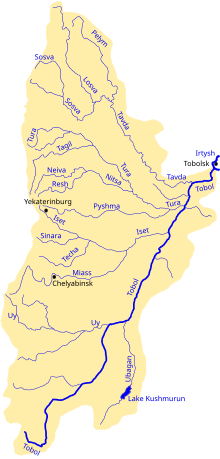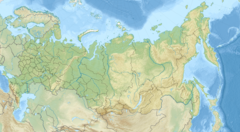The Tobol (Russian: Тобол, Kazakh: Тобыл Tobyl, Siberian Tatar: Тубыл Tubyl) is a river in Western Siberia (in Kazakhstan and Russia) and the main (left) tributary of the Irtysh. Its length is 1,591 km (989 mi), and the area of its drainage basin is 426,000 km2 (164,000 sq mi).[1]
| Tobol | |
|---|---|
 Confluence of Irtysh and Tobol in Tobolsk in 1912 | |
 Map of the Tobol watershed | |
| Location | |
| Country | Russia, Kazakhstan |
| Physical characteristics | |
| Source | Turgay Plateau |
| • location | Kairakty, Russia |
| • coordinates | 51°28′01″N 61°00′29″E / 51.467°N 61.008°E |
| • elevation | 271 m (889 ft) |
| Mouth | Irtysh |
• location | Tobolsk, Russia |
• coordinates | 58°09′14″N 68°12′55″E / 58.1539°N 68.2153°E |
• elevation | 32 m (105 ft) |
| Length | 1,591 km (989 mi) |
| Basin size | 426,000 km2 (164,000 sq mi) |
| Discharge | |
| • average | 805 cubic metres per second (28,400 cu ft/s) |
| Basin features | |
| Progression | Irtysh→ Ob→ Kara Sea |
| River system | Ob |
History
editThe Tobol River was one of the four important rivers of the Siberia Khanate. In 1428 the khan was killed in a battle with the forces of Abu'l-Khayr Khan at the Battle of Tobol.[2]
In the 16th century, the Tobol was the eastern terminus of the portage route leading westward to the rivers Vishera and Kama.
Cities and towns on the Tobol
editMain tributaries
editThe largest tributaries of the Tobol are, from source to mouth:[1]
References
edit- ^ a b "Река Тобол in the State Water Register of Russia". textual.ru (in Russian).
- ^ Forsyth, James (1992). A History of the Peoples of Siberia: Russia's North Asian Colony, 1581-1990. Cambridge University Press. p. 25. ISBN 0-521-47771-9.
